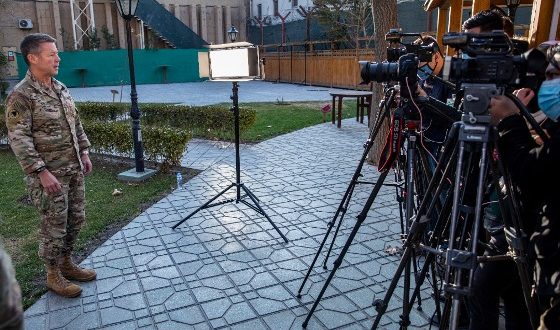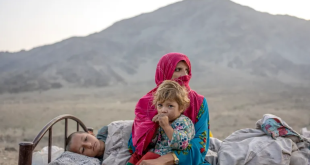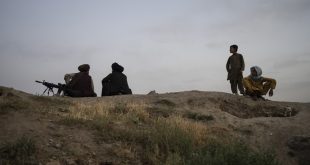“The violence is too high. The Taliban violence needs to come down. We’ve had many discussions about this.”
AT News
KABUL: Gen. Scott Miller, the top U.S. commander in Afghanistan, said that he has received orders of cutting down the number of American soldiers to 2,500. Talking to the reporters on Sunday, Mr. Miller expressed concerns on surge in the Taliban violence, saying that the Taliban needed to come down.
The US would continue supporting the Afghan security forces but at simultaneously try to make sure that “sight of the counterterrorism commitments as well.”
“We can continue to support the Afghan security forces, and at the same time, make sure that “we don’t lose sight of the counterterrorism commitments as well,” Gen. Miller said.
The US top commander in Afghanistan cited the remarks at a time, while there are great concerns about the empowerment of the insurgents after the US troop drawdown in the country.
The rest is the complete News Conference of Resolute Support Commander Gen. Scott Miller
Reporter: Thank you, General. Please tell us about reduction of the troops in Afghanistan, could you give us information about this?
Gen Miller: I think all of you are aware that I have orders to reduce the U.S. military presence to 2500. And part of this is in line with the US Taliban agreement of, you know, as we downsize our troops in accordance with the conditions. It’s important for the Afghan people to understand that we have discussed this very carefully with the Afghan security forces. We still have a force that’s capable of providing the necessary support to the Afghan security forces. We still have our train, advise and assist mission that takes place. And we certainly have the ability to protect our force as well as meet our counterterrorism commitments. One piece it is very important, though, is that’s just the U.S. contribution. As you look at Resolute Support, it’s made up of more than U.S. forces and the other participating countries are still retaining their capabilities as well inside Afghanistan.
Reporter: Do you have concern about the increase of violence in Afghanistan? And have you talked with the Taliban about this issue?
Gen Miller: Yeah, I actually have talked to the Taliban about this. The violence is too high. The Taliban violence needs to come down. We’ve had many discussions about this. We have what we refer to as a historic opportunity–the ongoing peace process where representatives of the Republic of Afghanistan are sitting down with the Taliban. And we need to make sure from the military and security standpoint, and to provide the confidence to the people of Afghanistan, that we give this the best opportunity to be successful. So, yeah, violence is too high, it has to come down everywhere. As I’ve said before, as your violence goes up, the risk you run is that the Afghan people pay the price. We need to get that ideally reduced to zero, but certainly bring it down quite a bit from where it is.
Reporter: [Inaudible]
Gen Miller: When you look at the agreement with the Taliban, it is conditions-based. They have to meet conditions. So you have a political process, you have counterterrorism concerns and you have the rest. But again, it’s a conditions-based agreement. Ideally we’re able to meet all the conditions, bring Afghanistan to a point where it’s stable and secure and has politically solved all its problems. But again, a conditions-based agreement.
Reporter: How many troops are left in Afghanistan? How many bases have closed, and how many bases are open in Afghanistan? Tell us please.
Gen Miller: Rather than go into the specifics of the bases, I think it’s important that my orders are to have no more than 2500 U.S. troops by the 15th of January. And that’s a process, so we’re starting to move down in that direction. Our previous number was 4500 U.S. military. So we’re between 4500 and starting to move down to our 2500 footprint now.
Reporter: General, as it has been requested many times from Taliban to reduce the violence, as well you talked with them in Qatar. So, in the long run, if they do not do this, what will be the reaction of NATO?
Gen Miller: Before I go to the reaction of NATO, if the Taliban don’t reduce violence–we can’t bring the violence down–my greatest fear is that we’re missing an opportunity that has taken 20 years to get here. That’s my concern.
Reporter: And based off the Taliban and US agreement, in your opinion, what do you say about the release of another seven thousand Taliban prisoners?
Gen Miller: That is actually an Afghan decision. That’s something that will be worked between Afghans. So that is, you know, that’s between them. That’s why we have a negotiation going on.
Reporter: Afghanistan’s government has already conveyed its opposition over the releasing of seven thousand other Taliban prisoners.
Gen Miller: Yeah, again, that will be a political discussion. That’s why you have the two sides meeting and they will determine the timetables for any further releases. It won’t be a military decision.
Reporter: Recently US forces defended Afghan forces in Kandahar. Will they continue to defend Afghan forces and help them on the battleground?
Gen Miller: Yes, again, our commitment to the Afghan security forces remains. Ideally, we don’t have to do that because the violence goes down to an appropriate level. But very clearly, we’re fully committed to supporting our Afghan security partners, and it’s in accordance with the US-Taliban agreement as well.
Reporter: Thank you. My second question, recently Afghan forces killed the key leaders of al-Qaeda in Helmand and in Nimroz as well, and there are reports they are coming from Iran. So what is your information about al-Qaeda activities?
Gen Miller: It’s something we keep a close eye on. There are clear counterterrorism commitments in both the US-Taliban agreement as well as the joint declaration between the US and the Afghan government. And that’s not negotiable. The idea that Afghanistan will never again be used as a safe haven for terrorism, that’s important not just to the United States of America, but that’s important to the world.
Staff: Do you have a message for the Afghan forces?
Gen Miller: Even though the number comes down–as we look at our numbers closely–we work through capabilities and we still possess the capabilities to support the Afghan security forces. That’s institutionally, as well as in combat. And that commitment remains remain secure.
Reporter: And with the 2500 troops you can combat against insurgents in Afghanistan?
Gen Miller: We can continue to support the Afghan security forces, and at the same time, make sure that we don’t lose sight of the counterterrorism commitments as well.
 Afghanistan Times
Afghanistan Times




